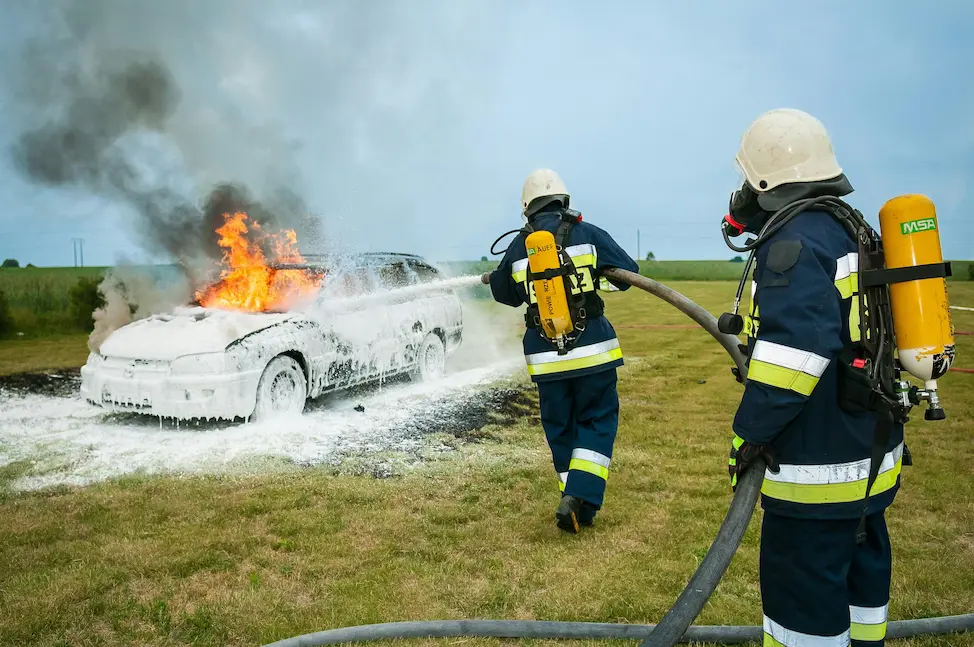
Wondering how to protect your car against fires? No worries! In Quebec, your auto insurance typically includes coverage for fire damage, whether accidental or malicious.
This protection is an integral part of your contract, whether in Chapter A for civil liability or Chapter B for vehicle damage.
Ready to learn more about fire protection for your car? Keep reading!
What is fire coverage in auto insurance?
Fire coverage in auto insurance protects you against damage caused by fire, whether accidental or malicious. In Quebec, this protection is an integral part of automobile insurance contracts.
You can opt for “all-risk” insurance that includes this coverage or add it to third-party insurance. And good news! In Quebec, fire service fees charged by your municipality are reimbursed under this coverage.
Is fire covered by civil liability?
Civil liability covers firefighter intervention costs, even if the incident occurs outside your municipality of residence. However, to benefit from this coverage, you must be held responsible for the fire.
Why can fire-related costs increase?
Costs can rise for several reasons:
- Extended firefighter intervention
- Travel outside your municipality
- Use of specialized equipment
- High risk of spread
Your insurance covers these additional costs following a fire, but be aware that prices can vary by location. In accidents involving multiple vehicles, some charges might be split between insurers.
Damage caused by negligence
Be careful, fires resulting from your negligence aren’t covered by insurance. For example, if you neglect vehicle maintenance or install non-compliant devices, you could be held responsible even if you’re insured. In these cases, the insurer will deny compensation. You’ll then have to cover repairs and deductible.
💡Note that this exclusion doesn’t apply to vandalism or bodily injury to others.
How to file a car fire insurance claim?
Opening a claim file
You must contact your insurer or broker promptly to create your claim file. Note the exact time, location, and circumstances of the incident. It’s crucial to quickly gather all useful information for your claim.
Here are the steps to follow:
- Call your insurance company
- Provide fire details
- Get a file number
- Request the list of required documents
Remember to keep written records of your communications. This will help you track your file and ensure efficient claim processing.
Meeting declaration deadlines
Be careful, you generally have 5 days to report an auto claim. This short deadline is an important condition of your contract. Beyond this time, you risk compromising your compensation.
We’ll say it again: 5 days, not one more! Note this deadline as soon as the incident occurs. Every day counts to assert your rights. A wise person respects this deadline strictly.
Evidence to provide to the insurer (or broker)
Here are typically requested documents:
- Fire department report
- Police report
- Photos of the burned vehicle
- Repair invoices (if applicable)
For criminal or unexplained fires, an official investigation report may be required. This helps validate your claim with insurance.
How is compensation calculated?
The reimbursement calculation depends on several factors. For total fire loss, the assessment is based on the vehicle’s replacement value. The insurer considers the car’s age and condition before the incident.
The type of contract also influences the amount: all-risk coverage offers more protection than third-party insurance. Keep proof of your car’s purchase value. This will help you get fair and equitable compensation.
How to prevent car fires?
Adopt good maintenance practices
To protect your vehicle against fire risks, we recommend following these essential steps:
- Regularly check the fuel system for leaks
- Inspect electrical cables for signs of wear
- Control mechanical devices to ensure proper operation
- Have necessary repairs done by a professional garage
Preventive maintenance effectively reduces potential failures and limits fire risks. Don’t hesitate to use appropriate products to keep your car in perfect condition.
Understanding electric vehicle risks
Electric vehicles present specific fire risks. Their electronic components and battery can cause fires due to failure or overheating. To determine the source of a problem, we recommend having your car’s electrical system checked regularly.
In case of accident, fire risk can be higher with an electric vehicle. Strictly follow manufacturer protocols and perform frequent checks to minimize these dangers.
Avoid improvised repairs
There’s a reason why mechanical experts exist. Poorly installed accessories or non-approved parts can cause short circuits leading to fire.
As an owner, you’re responsible for your vehicle’s safety. It’s therefore mandatory to be cautious regarding technical modifications. This article reminds you it’s better to avoid DIY work on critical car elements.
Compare fire coverage with Gendron Assurance!
Looking for the best fire protection for your car? Gendron Assurance can help. Our broker team will assess your needs and compare options for you. We handle everything, offering peace of mind and tailored coverage for fire-related material damage.
Fill out our form today for a personalized quote!
Frequently asked questions about car fire insurance
What are common causes of car fires?
Common causes of car fires include fuel leaks, electrical problems, and mechanical failures. Watch out for non-compliant accessories that increase risks! Note that propane tanks or gas cans can worsen the situation. These incidents typically occur during vehicle use or shortly after engine shutdown. Your negligence could invalidate your coverage, stay vigilant!
What to do in case of total loss?
Contact your insurer quickly, within 5 days maximum, to report the incident. Compensation will be calculated based on your vehicle’s replacement value. A police investigation is often required to determine the fire’s origin. Your fire coverage, whether included in all-risk or third-party policy, will cover costs related to total car loss.
How to choose the most advantageous deductible?
Carefully evaluate the relationship between deductible amount and total premium cost. This decision varies based on several factors: vehicle value, driving history, and risk level. Remember that the deductible applies to fire coverage. A wise choice will prevent too heavy a financial burden in case of incident.
